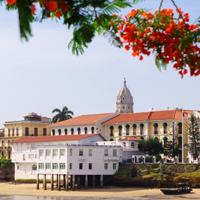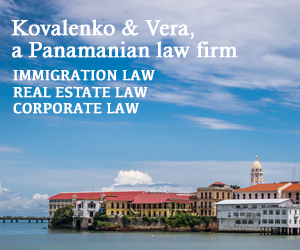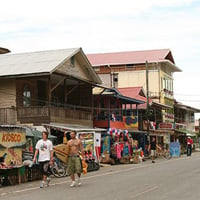Digital Nomad Life in Isla Taboga, Panama
Summary: Digital nomads like living in Altos del Maria, Panama because of its affordable cost of living, beautiful scenery, and friendly locals. The approximate population of Altos del Maria, Panama is around 5,000 people. The monthly cost of living for a digital nomad in Altos del Maria is around $1,000 USD. It costs around $400 USD to rent a centrally located, one-bedroom apartment with high-speed internet access in Altos del Maria. The best neighborhood to live in is El Valle, which is known for its stunning views of the mountains and its close proximity to the beach. The weather in Altos del Maria, Panama is typically warm and humid, with temperatures ranging from the mid-70s to the mid-80s Fahrenheit.
How do I meet people in Isla Taboga?
When we asked people living in Isla Taboga about club and activities where newcomers can meet others, they responded:
"Isla Taboga, is a small island with a tight-knit community, and expats often find themselves joining local clubs and participating in community activities to meet people and integrate into the local culture. One popular activity is joining local fishing clubs, where expats can engage with locals and other expats while enjoying the island's rich marine life. Expats also participate in local festivals and events, such as the annual Patron Saint Festival, which is a great way to meet people and experience the local culture. The island's community center often hosts events and activities that are open to everyone, providing another opportunity for expats to socialize and meet new people. Outdoor activities are also popular on the island, with many expats joining local hiking groups or participating in beach clean-ups. These activities not only provide a chance to meet people but also to contribute to the preservation of the island's natural beauty. In addition to joining clubs and participating in community activities, expats often meet people through their daily routines. Simple activities like shopping at the local market, dining at local restaurants, or attending church services can lead to conversations and friendships with both locals and other expats. Finally, volunteering is another way that expats meet people when living in Isla Taboga. Many local organizations and charities welcome the help of expats, and volunteering can be a rewarding way to give back to the community while making new friends," said one expat in Isla Taboga.
What is life like in Isla Taboga?
When we asked people living in Isla Taboga what life is like and how people spend their time, they said:
"Life for expats and digital nomads in Isla Taboga is a unique blend of tranquility and adventure. The island, often referred to as the "Island of Flowers", is a paradise for nature lovers with its lush vegetation, beautiful beaches, and abundant wildlife. The slow pace of life on the island provides a peaceful environment for those looking to escape the hustle and bustle of city life. The local community is welcoming and friendly, making it easy for expats and digital nomads to integrate and make new friends. The island's small size also means that everything is within walking distance, from the local grocery store to the beach. Despite its small size, Isla Taboga has a reliable internet connection, making it a suitable place for digital nomads to work from. There are also several cafes and restaurants where one can work while enjoying the island's scenic views. The cost of living is relatively low compared to other popular expat destinations, making it an attractive option for those on a budget. The local cuisine is a blend of traditional Panamanian dishes and international fare, offering a variety of options for every palate. The island's close proximity to Panama City also means that expats and digital nomads have easy access to the amenities and services of a major city. Regular ferry services make it easy to travel between the island and the city. However, it's worth noting that the island's laid-back lifestyle may not be for everyone. Those seeking a vibrant nightlife or a wide range of cultural activities may find the island's offerings limited. Additionally, while English is widely spoken in Panama, the primary language on Isla Taboga is Spanish, so some knowledge of the language can be beneficial. Overall, life for expats and digital nomads in Isla Taboga offers a unique opportunity to live and work in a tropical paradise, surrounded by natural beauty and a welcoming community," explained one person living in Isla Taboga, Panama.

Kovalenko & Vera is a Panamanian law firm that specializes in immigration law, corporate law, real estate law, banking, contract negotiation, taxes and flag registry. With more than 20 years of professional practice, Kovalenko & Vera builds lasting relationships with our clients to ensure your interests are safeguarded.
Click connect to have our partner contact you via e-mail and/or phone.

Kovalenko & Vera is a Panamanian law firm that specializes in immigration law, corporate law, real estate law, banking, contract negotiation, taxes and flag registry. With more than 20 years of professional practice, Kovalenko & Vera builds lasting relationships with our clients to ensure your interests are safeguarded.
Click connect to have our partner contact you via e-mail and/or phone.
Where should I live in Isla Taboga?
We asked digital nomads and expats how they chose their neighborhood and found a place to live. They answered:
"Finding a place to live in Isla Taboga, involves several steps. First, you need to determine your budget and the type of accommodation you're looking for. This could range from a small apartment to a large house, depending on your needs and financial capabilities. Next, you should research the different neighborhoods on the island to find one that suits your lifestyle and preferences. Some areas might be closer to the beach, while others might be more residential or closer to amenities like shops and restaurants. Once you have a clear idea of what you're looking for, you can start your search. There are several online real estate platforms that list properties for rent or sale in Isla Taboga, such as Encuentra24, Compreoalquile, and Panama Realtor. These websites allow you to filter your search based on location, price, property type, and other factors. In addition to online searches, you might also want to consider hiring a local real estate agent. They can provide valuable insight into the local market, help you negotiate prices, and guide you through the legal process of renting or buying property in Panama. Visiting the island and viewing properties in person is also highly recommended. This allows you to get a feel for the area, inspect the condition of the property, and meet potential landlords or sellers. Finally, once you've found a property you're interested in, you'll need to negotiate the terms of the lease or sale, review the contract carefully, and then sign the agreement. If you're buying a property, you'll also need to arrange for the payment and transfer of ownership. Remember, moving to a new place can be a complex process, so it's important to do your research and seek professional advice if needed," explained one person living in Isla Taboga, Panama.
What do I need to know before moving to Isla Taboga?
When we asked people what advice they would give someone preparing to move to Isla Taboga, they said:
"Expats considering retirement in Isla Taboga should be aware of several key factors. Firstly, the cost of living is generally lower than in many Western countries, but it can vary depending on lifestyle choices. The official language is Spanish, so learning the language or at least basic phrases can be beneficial. Healthcare in Panama is of a high standard, particularly in Panama City, but it's important to secure comprehensive health insurance. The climate is tropical, with a wet and a dry season, and it can be quite humid. Isla Taboga is a small island with a limited number of amenities and services, so for more complex needs, one would need to travel to Panama City. The island is known for its beautiful beaches and nature, offering a peaceful and relaxed lifestyle. Panama uses the US dollar as its currency, which can make financial transitions easier for American retirees. The country has a program called the "Pensionado" which offers numerous discounts and benefits to retirees, but specific requirements must be met to qualify. Panama's residency process is relatively straightforward, but it's recommended to hire a local attorney to navigate the legalities. Lastly, it's important to visit and spend time in Isla Taboga before making the decision to retire there, to ensure it suits your lifestyle and preferences," said one person in Isla Taboga.
 Kovalenko & Vera Attorneys at Law in Panama
Kovalenko & Vera Attorneys at Law in PanamaConnect
Kovalenko & Vera is a Panamanian law firm that specializes in immigration law, corporate law, real estate law, banking, contract negotiation, taxes and flag registry. With more than 20 years of professional practice, Kovalenko & Vera builds lasting relationships with our clients to ensure your interests are safeguarded.
Click connect to have our partner contact you via e-mail and/or phone.
 Kovalenko & Vera Attorneys at Law in Panama
Kovalenko & Vera Attorneys at Law in PanamaKovalenko & Vera is a Panamanian law firm that specializes in immigration law, corporate law, real estate law, banking, contract negotiation, taxes and flag registry. With more than 20 years of professional practice, Kovalenko & Vera builds lasting relationships with our clients to ensure your interests are safeguarded.
Connect
Click connect to have our partner contact you via e-mail and/or phone.
What do people appreciate most about the culture in Isla Taboga?
"Expats in Isla Taboga, appreciate the warm and welcoming nature of the local people, who are always ready to help and make them feel at home. They love the relaxed pace of life on the island, which is a stark contrast to the hustle and bustle of city life. The rich history and vibrant culture of the island, with its colorful festivals and traditions, are also highly appreciated. Expats enjoy the fresh seafood and local cuisine, which is a blend of Afro-Caribbean, Spanish, and indigenous influences. They also value the natural beauty of the island, with its pristine beaches, lush vegetation, and abundant wildlife. The sense of community on the island is strong, and expats appreciate the opportunity to be part of this close-knit society," said one expat in Isla Taboga.

Kovalenko & Vera is a Panamanian law firm that specializes in immigration law, corporate law, real estate law, banking, contract negotiation, taxes and flag registry. With more than 20 years of professional practice, Kovalenko & Vera builds lasting relationships with our clients to ensure your interests are safeguarded.
Click connect to have our partner contact you via e-mail and/or phone.

Kovalenko & Vera is a Panamanian law firm that specializes in immigration law, corporate law, real estate law, banking, contract negotiation, taxes and flag registry. With more than 20 years of professional practice, Kovalenko & Vera builds lasting relationships with our clients to ensure your interests are safeguarded.
Click connect to have our partner contact you via e-mail and/or phone.
What do people find most challenging about the culture in Isla Taboga?
"Expats in Isla Taboga often find the language barrier to be the most challenging aspect of the local culture, as Spanish is the primary language spoken and not everyone is fluent in English. The slower pace of life, known as "island time", can also be a challenge for those accustomed to a faster, more structured lifestyle. Additionally, the lack of certain amenities and services that they might be used to in their home countries can be difficult to adjust to. The heat and humidity can also be a challenge for those not used to tropical climates. Lastly, understanding and adapting to local customs and etiquette can also pose a challenge for some expats," said one expat in Isla Taboga.
What residency documents or visas did I need if I will be in Isla Taboga for a while?
"If you plan to stay in Isla Taboga for an extended period, you will need to obtain the appropriate visa or residency documents. The type of visa or permit you need depends on the purpose and duration of your stay. If you are visiting as a tourist, you may not need a visa if your stay is less than 180 days. However, you will need a passport that is valid for at least six months beyond your planned departure date. If you plan to work or study in Panama, you will need to apply for a specific visa, such as a work visa or student visa. These visas require additional documentation, such as proof of employment or enrollment in a school. If you plan to stay in Panama for more than 180 days, you will need to apply for a temporary or permanent residency permit. This process involves providing proof of financial self-sufficiency, undergoing a medical examination, and submitting a police clearance certificate. Regardless of the type of visa or permit you apply for, you should expect to provide several documents, such as a completed application form, passport-sized photos, and a copy of your passport. You may also need to provide additional documents depending on your specific circumstances. It's important to note that visa and residency requirements can change, so you should check with the nearest Panamanian embassy or consulate for the most up-to-date information," said one person in Isla Taboga.
 Kovalenko & Vera Attorneys at Law in Panama
Kovalenko & Vera Attorneys at Law in PanamaConnect
Kovalenko & Vera is a Panamanian law firm that specializes in immigration law, corporate law, real estate law, banking, contract negotiation, taxes and flag registry. With more than 20 years of professional practice, Kovalenko & Vera builds lasting relationships with our clients to ensure your interests are safeguarded.
Click connect to have our partner contact you via e-mail and/or phone.
 Kovalenko & Vera Attorneys at Law in Panama
Kovalenko & Vera Attorneys at Law in PanamaKovalenko & Vera is a Panamanian law firm that specializes in immigration law, corporate law, real estate law, banking, contract negotiation, taxes and flag registry. With more than 20 years of professional practice, Kovalenko & Vera builds lasting relationships with our clients to ensure your interests are safeguarded.
Connect
Click connect to have our partner contact you via e-mail and/or phone.
What cultural blunders should I try to avoid making in Isla Taboga?
We asked people in Isla Taboga if they could share any humorous cultural blunders they commited. They wrote:
"When visiting Isla Taboga in Panama, it's important to respect the local customs and traditions. Avoid wearing revealing clothing, especially in religious or traditional settings, as it is considered disrespectful. Panamanians value punctuality, so try not to be late for appointments or social gatherings. Avoid discussing sensitive topics such as politics, religion, or personal finances, as these can be seen as intrusive or disrespectful. It's also considered rude to interrupt someone while they're speaking, so wait for your turn to talk. When dining, remember that it's customary to finish everything on your plate as a sign of appreciation for the meal. Also, tipping is expected in restaurants, so be sure to leave a tip of around 10-15% of your bill. Avoid pointing with your fingers, as this is considered rude. Instead, use your whole hand to gesture. Lastly, remember to greet people with a handshake and maintain eye contact, as this is seen as a sign of respect and sincerity," explained one person living in Isla Taboga, Panama.
 Kovalenko & Vera Attorneys at Law in Panama
Kovalenko & Vera Attorneys at Law in PanamaConnect
Kovalenko & Vera is a Panamanian law firm that specializes in immigration law, corporate law, real estate law, banking, contract negotiation, taxes and flag registry. With more than 20 years of professional practice, Kovalenko & Vera builds lasting relationships with our clients to ensure your interests are safeguarded.
Click connect to have our partner contact you via e-mail and/or phone.
 Kovalenko & Vera Attorneys at Law in Panama
Kovalenko & Vera Attorneys at Law in PanamaKovalenko & Vera is a Panamanian law firm that specializes in immigration law, corporate law, real estate law, banking, contract negotiation, taxes and flag registry. With more than 20 years of professional practice, Kovalenko & Vera builds lasting relationships with our clients to ensure your interests are safeguarded.
Connect
Click connect to have our partner contact you via e-mail and/or phone.
About the Author
 Joshua Wood, LPC is one of the Founders of Digital Nomad Exchange and serves as Co-President of Expat Exchange. Prior to Expat Exchange and Digital Nomad Exchange, Joshua worked for NBC Cable (MSNBC and CNBC
Primetime). Joshua has a BA from Syracuse and a Master's in Clinical and Counseling Psychology from Fairleigh Dickinson University. Mr. Wood is also a licensed counselor and psychotherapist.
Joshua Wood, LPC is one of the Founders of Digital Nomad Exchange and serves as Co-President of Expat Exchange. Prior to Expat Exchange and Digital Nomad Exchange, Joshua worked for NBC Cable (MSNBC and CNBC
Primetime). Joshua has a BA from Syracuse and a Master's in Clinical and Counseling Psychology from Fairleigh Dickinson University. Mr. Wood is also a licensed counselor and psychotherapist.
Some of Joshua's articles include Pros and Cons of Living in Portugal, 10 Best Places to Live in Ireland and Pros and Cons of Living in Uruguay. Connect with Joshua on LinkedIn.

We've partnered with Kovalenko & Vera to help with your move.
Learn More
 Kovalenko & Vera Attorneys at Law in Panama
Kovalenko & Vera Attorneys at Law in PanamaWe've partnered with Kovalenko & Vera to help with your move.
Learn More
![]() Panama Forum
Panama Forum
Talk with other digital nomads and expats in Panama on our Panama forum - meet people, get advice and help others.
![]() Contribute
Contribute
Help others in Panama by answering questions about the challenges and adventures of living in Panama.
Digital Nomads in Panama offer advice about healthcare, hospital visits, emergency rooms visits, finding a doctor and buying health insurance in Panama.



